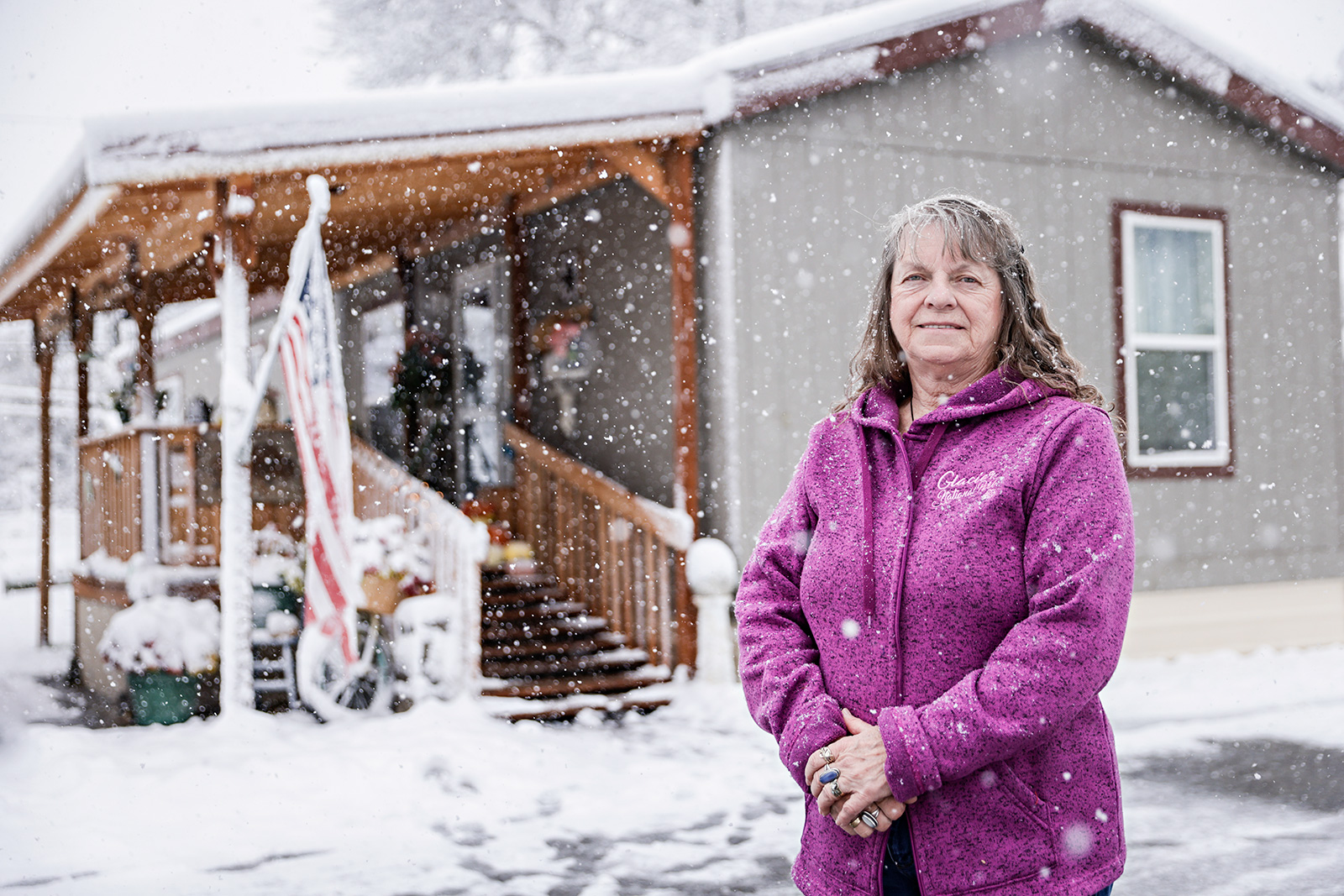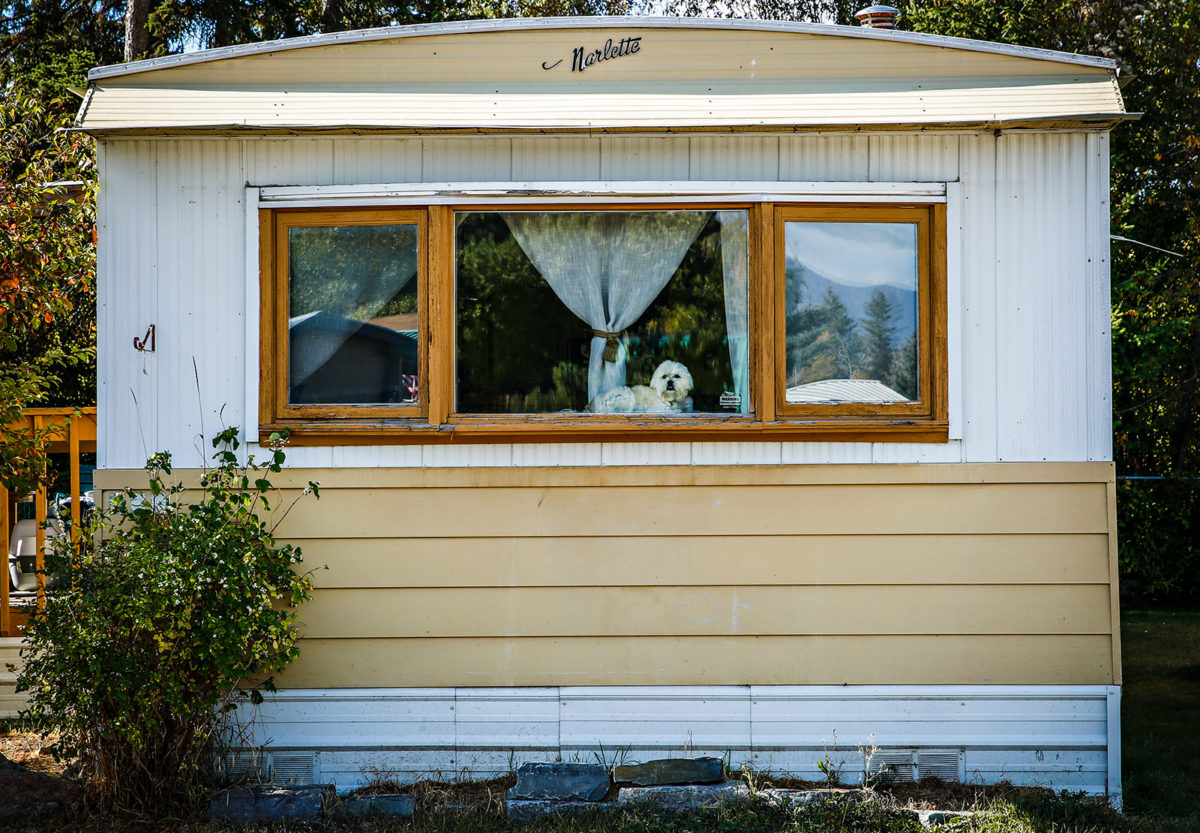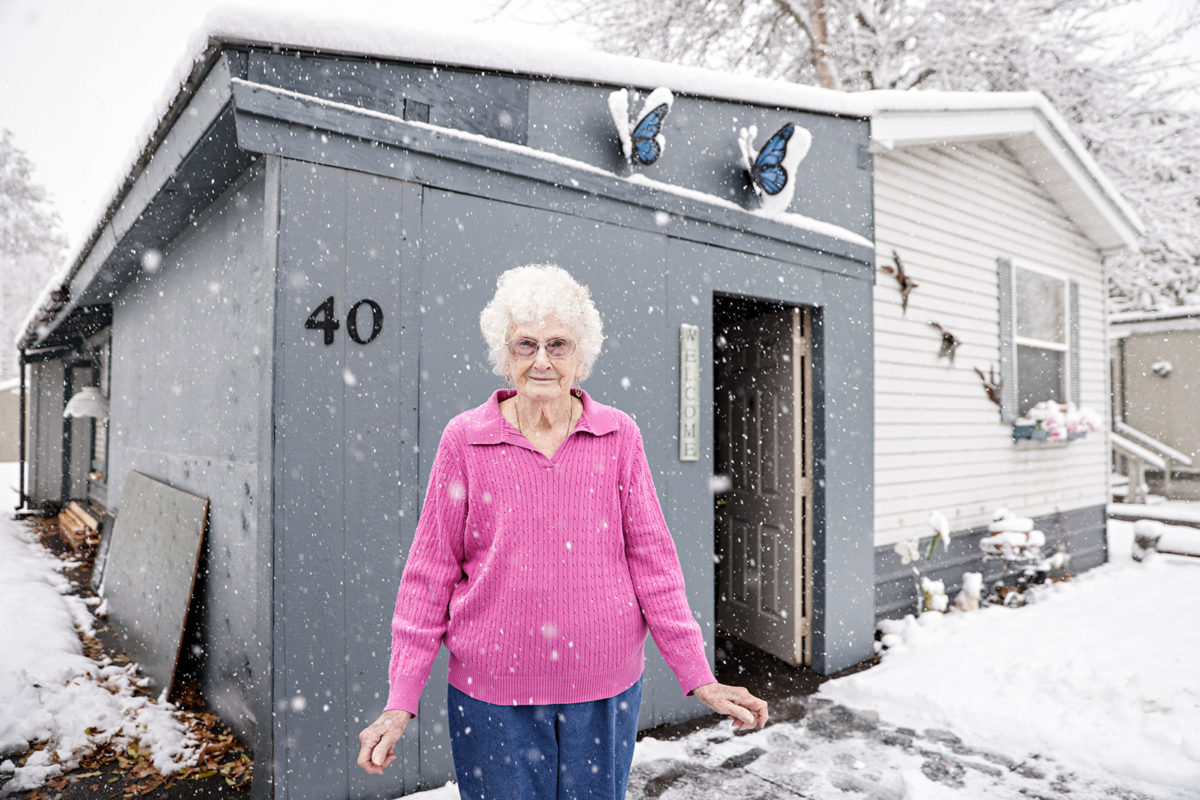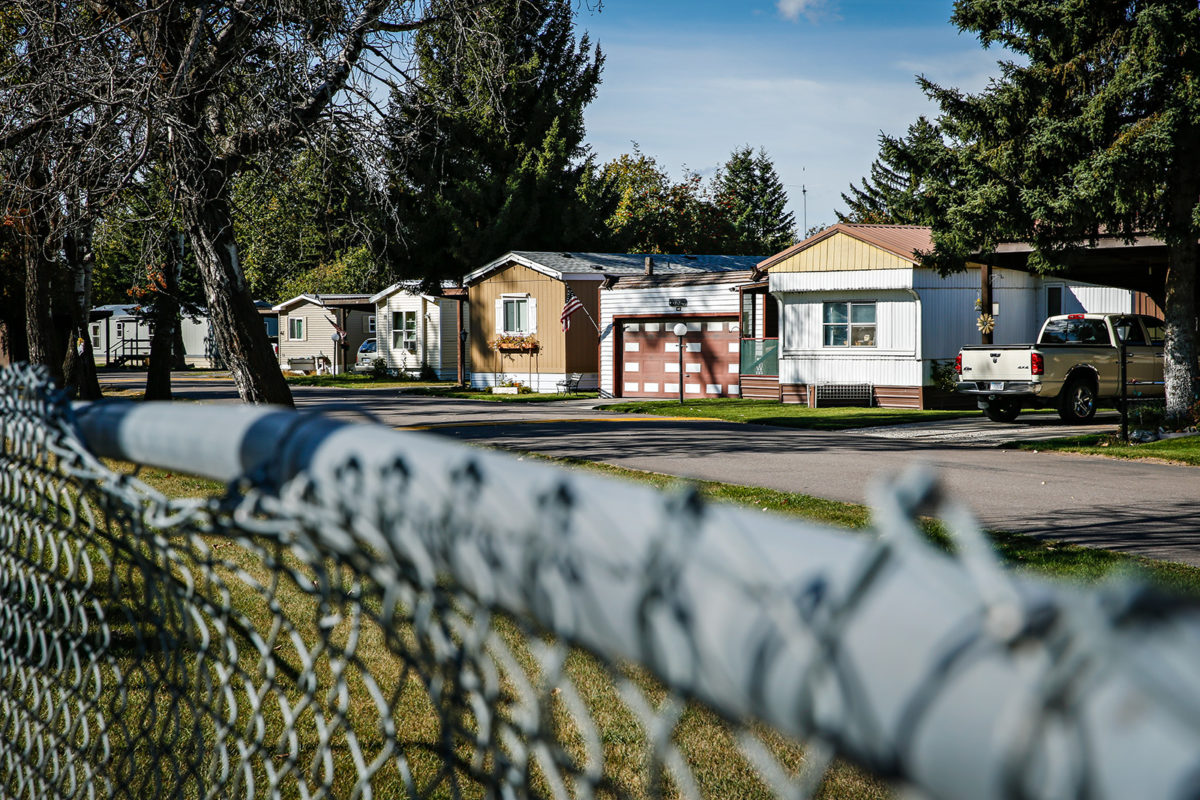Mobile Manipulation
Following a nationwide trend, residents in Flathead Valley mobile home parks are being priced out of their communities as landlords hike lot fees and surcharges, leaving low-income residents stuck with nowhere to move their homes as property owners operate with nearly no regulations
By Maggie Dresser
On the first day of December in 2018, Sharon Parmelee moved into Greenwood Village RV Park with her mobile home. She signed a month-to-month rental agreement and started paying $312 per month in lot rent fees in the park, which is located just outside of Kalispell city limits along U.S. Highway 2.
The mobile home park, which has roughly 85 manufactured homes and RVs in addition to a hotel and cabin accommodations called Greenwood Village Inn and Suites, is home mostly to individuals over the age of 50, many of whom are veterans, senior citizens or people living with disabilities on a fixed income.
About six months after Parmelee moved into the park, which she described as a nice place to live with good neighbors, the former owner sold the property and new management took over. She signed a new rental agreement that June and started paying $400 per month. In October 2021, she received a notice of another monthly rent hike amounting to $550. By August 2022, it rose again to $700 per month.
Several months later, Parmelee received another notice — an amendment to the park rules that required an additional $1 per square foot charge for any structure on a tenant’s lot with a covering, excluding their residence or carport. The surcharge applied to porches, decks, storage buildings and sheds; for example, if a tenant had a 100-square-foot shed on their lot, they would pay an extra $100 per month in rent.
“We have complied to all of these raises,” Parmelee said in her trailer at Greenwood Village in November. “But this is ridiculous. We’re maxed out — most of the people in this park are maxed out. These citizens are on fixed incomes and some people are disabled.”
The frequent rent increases, roughly 35% each time, have left park residents with limited options. In November, residents were frantically removing deck coverings and demolishing additions on their trailers before the new park rule took effect on Dec. 1. Other tenants investigated moving their trailers to new locations, but with a zero percent vacancy in all other parks, there was nowhere else to go. Moreover, many lacked the funds to move their homes, which costs around $10,000.
At NeighborWorks Montana, a nonprofit that helps residents take over ownership of mobile home parks, Danielle Maiden says these rent hikes are becoming commonplace across the country. In many cases, she said communities that were traditionally designed for low-income homeownership are now being taken over by investors.
Three years ago, Havenpark Capital Partners, a Utah-based real estate investment firm with a history of complaints and rent hikes, purchased Meadow Manor, a manufactured community in Evergreen. As of 2020, the company had properties in 11 states.
“It’s becoming common for investors to make a profit,” Maiden said. “It’s easy to make those increases and then people are stuck in them. Montana parks have a history of mom-and-pop owners … many lived in the park and cared about the residents.”
According to a Real Capital Analytics 2021 report, institutional investors accounted for 23% of manufactured housing parks purchased over the previous two years.
“It increases their income,” Maiden said. “With how expensive housing is everywhere, they are able to do it and get away with it. In the Flathead, we have no parks with vacancy. And parks that do have vacancy have an age or condition limit.”
According to federal and NeighborWorks data, manufactured housing accounts for 10% of total housing stock in Montana compared to 6% nationwide.
The owner of Greenwood Village, who is a local Certified Public Accountant (CPA), did not wish to comment on this article and referred the Beacon to the park’s manager.

After receiving the notice about the new additional charges for outbuildings, Greenwood Village residents were outraged. Leading the charge, Parmelee, who is 78, began calling local attorneys and officials in Helena to find out how to file a lawsuit against the park owner.
But nobody would take the case because the owner was operating within legal limits.
“There is no good news,” Parmelee said. “The bad news is in Montana there is not much regulation for rent or square footage. The landlord can do whatever he feels is reasonable.”
In Montana, rent control does not exist and property-owners have almost complete control. According to the 2007 Montana Residential Mobile Home Act, the tenant must pay rent “as determined by the landlord.”
At Greenwood Village, the manager gave residents the required 90-day notice of the covered structure fee, said Susan Gobbs, an attorney who contracts with the Montana Department of Public Health and Human Services (DPHHS) and specializes in aging services.
“There’s nothing under the Residential Mobile Home Act that says you can’t do this … I have practiced law for 35 years and I have never seen this,” Gobbs said referring to the covered structure fee. “We did refer this case to Montana legal services, and I believe their analysis is the same as ours – they have declined to represent these folks. We don’t think it’s against any laws. It’s just something brand new.”
Gobbs says that while some states have measures like rent control to protect tenants from these situations, Montana primarily operates under the Residential Landlord and Tenant Act of 1977. Landlords can raise rent as often as desired and the only major difference between the Landlord Tenant Act and the Mobile Home Act is the landlord in a mobile home park must give the tenant a 90-day notice instead of a 30-day notice.
But mobile home residents have a greater disadvantage than someone renting an apartment or house, Gobbs says, and if the mobile homeowner ceases paying lot rent for 90 days, they often abandon their trailer, which winds up in the landlord’s ownership.
“Historically, trailer parks are places where low-income people could be,” Gobbs said. “They can afford to buy a trailer, but they lose an asset if they can’t move that trailer. For most Americans, homeownership is the biggest asset people have. We’ve seen rent increases across the state, and I deal with people who are 60 or older and disabled. We see people who have never had an issue with housing who are having issues with housing.”
At Community Action Partnership of Northwestern Montana (CAPNM), a nonprofit that provides social services and advocacy for low-income populations, Deputy Director Cassidy Kipp says the organization has seen a dramatic increase in calls from people over age 60 who are experiencing housing instability.

Like Gobbs, Kipp is seeing seniors who traditionally have been settled with stable housing for decades who now can’t keep up with rent increases and are becoming displaced.
Kipp says some of her clients have become displaced from mobile home parks, and many homeowners are forced to abandon their trailers.
“We see that over and over again with the same units,” Kipp said.
At the Flathead County Agency on Aging, Carla Dyment said the organization is also seeing an uptick in calls from seniors who can’t keep up with rent hikes, people who are evicted from their homes, or their property taxes have become unaffordable.
“People in mobile home parks, anyone renting homes or apartments that aren’t subsidized — those people are at huge risk,” Dyment said. “There’s also property taxes that are going up … those taxes have increased so much in a short amount of time, but they are on a fixed income.”
A rise in property taxes is exactly the reason that Greenwood Village park manager Tyler Hickey says he is increasing rent.
“Taxes have gone up 150% since 2018,” Hickey said. “From when we first took over the property, it’s well over double now.”
Hickey defended the rent increase and said the lot rent is trying to keep up with competitors like Meadow Manor, which is charging $795 per lot.
Maiden, of NeighborWorks, says mobile home park lot fees in the Flathead Valley hover around $500 to $600 per month on average while resident-owned parks are around $300 per month.
As for the covered structure fee, Hickey says he implemented the extra charge to deter residents from adding on to their trailers and to keep the park tidy.
“We’re just trying to get everything clean,” Hickey said. “We are not allowing them to do additions, and nobody wants to follow the rules … the state issues a sanitary survey, and they are serious about it if it isn’t up to their standards.”
In addition to the manufactured homes, Hickey also runs an inn on the property, and he said the company has received complaints and bad reviews from customers who said there’s too much trash and dilapidated structures on the property.
“It’s a way to support and promote healthy and clean living,” Hickey said.
But while Hickey says the fees are intended to discourage additional structures on the property, the rental agreement also says the tenants must store any equipment inside of a storage unit.
“We have these things on our lot that we’re paying for that he’s requiring us to have and now he wants to charge us $1 per square foot,” said Rhonda Adams, who is 57 and has lived in Greenwood Village since 1989.

In order to protect tenant rights for the future, Gobbs says there needs to be reform in the state Legislature. She said the Landlord and Tenant Act has not been updated since 1977.
“The Landlord and Tenant Act needs to be reformed to reflect where Montana is, not where Montana was,” Gobbs said. “There have not been any overhauls of the act.”
So far in the 2023 Legislative session, there have been five bills introduced that involve housing, with only one that relates to rent – and it favors the rights of property owners.
Introduced by Republican Sen. Steve Fitzpatrick of Great Falls, Senate Bill 105 supports the prohibition of rent control for any residential or commercial property.
Other states have implemented laws that help prop up mobile home tenant rights, including a Vermont law that requires park owners to notify residents of plans to sell and allow them a chance to buy the property.
While Parmelee was able to move into a more affordable housing situation, she hopes legislators will overhaul the current laws that are in place enabling landlords to continue hiking up rent prices with no oversight.
Parmelee was fortunate to find a vacancy at a Green Acres Cooperative, a resident-owned park in Kalispell, and her trailer was in good enough condition to move.
She paid a company $10,000 to relocate her mobile home just across U.S. Highway 2 and, by early January, Parmelee was comfortable in her new community. After paying a one-time fee of $250 to join the cooperative, her lot fees are $327 per month — about half of what she was paying at Greenwood Village.
According to Maiden, there are four resident-owned parks in the Flathead and 17 statewide with two under contract in Livingston and Missoula.
Parmelee said she’s kept in contact with some of the other residents at Greenwood Village, where she said most of the covered sheds and decks have been removed and a few of her former neighbors have moved out. One of her neighbors, who was 94 years old, was forced to move to Oregon with her daughter after selling her mobile home for next to nothing, Parmelee said.
“I think I’m going to be happy here,” Parmelee said. “They haven’t raised the rent here for five years. But I imagine it will go up soon.”